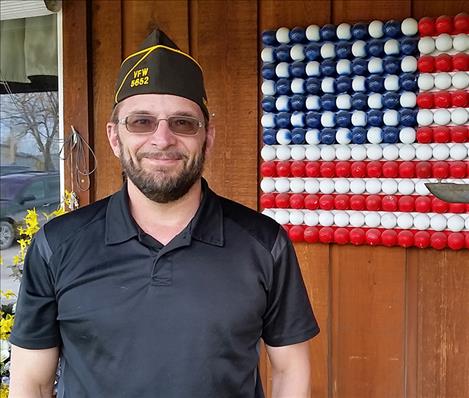Veteran Spotlight
Geofrey Rohrlach June 28, 1968 Operation Enduring Freedom/Iraqi Freedom 21st Combat Support, U.S. Army Staff Sergeant, E-6
Hey savvy news reader! Thanks for choosing local.
You are now reading
1 of 3 free articles.
While living his life, Geof adheres to several mottos. The most important is, “Take care of my family.” He came to the United States with his wife as a teacher. After several jobs in education and other occupations, he decided he really wanted to work in the medical field. He wanted a good life and to support his family, and the Army provided that option. He enlisted for four years under his green card status in March of 1999 with the goal of becoming a licensed practical nurse.
At age 29, Geof was one of the older recruits who reported for 10 weeks of basic training at Fort Sill, Oklahoma. To begin with, he felt tension among different racial and ethnic groups. He was also the target of kangaroo jokes because of his Australian background, although that helped the guys relax into a real unit. In the Army, everyone is “green.” It also helped build camaraderie when he put three shots in the center of a kangaroo target.
Geof went to Fort Sam Houston near San Antonio, Texas, for Advanced Individual Training, along with 10 to 15 guys from basic training. He got another 14 months of training with 91 Bravo and 91 Charlie to be a combat nurse/LPN. This felt like the right thing to do. He is still buddies with some of the people he met there.
Geof’s active duty assignment was to Fort Hood, Texas, to the 21st Combat Support in September of 2000. This unit was like a modern version of the old MASH units (Mobile Army Surgical Hospital), but it was called CSH, which stands for Combat Support Hospital and is pronounced “cash.” He was tasked with working in the Intensive Care Unit and trained a member of each platoon in emergency field care. If a wounded soldier survives the first “Golden Hour,” there is a 90 percent chance of ultimate survival, he said.
Geof remembers being in sergeant school when 9/11 struck. In February of 2002, he was deployed for six months to a field hospital in Kuwait and worked mostly in the ICU with injured soldiers from Afghanistan. Modern military gear protects the head and body but arms and legs are still vulnerable. There were a lot of amputations.
After Geof returned to Fort Hood and was discharged in 2003, he went home to Montana where his children’s grandparents lived. He quickly joined the 4225th Reserve unit out of Fort Harrison in Helena for another four years. He didn’t want anyone else to have to do the job he was trained for.
He was deployed in 2005 to the Landstuhl Regional Medical Center in Germany, which is where the wounded from Middle East operations were sent. During that time, he worked with about 800 patients with about 3,000 being cared for by his deployed unit in a 14-month period. In the 1930s, the location was where one of Hitler’s old youth training camps was located. It had an unusual layout with separate buildings and long hallways.
Geof was able to do some traveling while in Germany, including a visit to Belgium where his great uncle was a bomber pilot and is buried. His uncle was shot down during the Battle of the Bulge and died after saving his crew.
Another of Geof’s life mottos is, “Patients are the reason I’m here.” He worked at making personal connections with his patients. One guy from the United Kingdom had a bad attitude and was angry with everything. Geof found a cup with a British flag and fixed him toast with marmalade and things were better after that. Another time in the “ortho” ward (orthopedic) an amputee who had an external fixator in his leg was having a hard time. Geof convinced him that if he positioned his leg just right he could change channels on the TV. When the guy tried it, Geof used the remote in his pocket to change the channels. Geof always looked for ways to be a catalyst to help his patients get through their ordeals.
Geof has no regrets about moving to America and becoming an American citizen because another of his life mottos is to “grow where you’re planted.”
The military gave him a career and many years of structure. He was glad to be part of Army medical teams and is now glad to be part of the Ronan VFW. He still works as a nurse practitioner and spends time with his fellow veterans. Thank you for your service, Geof.















%20copy.jpg)

